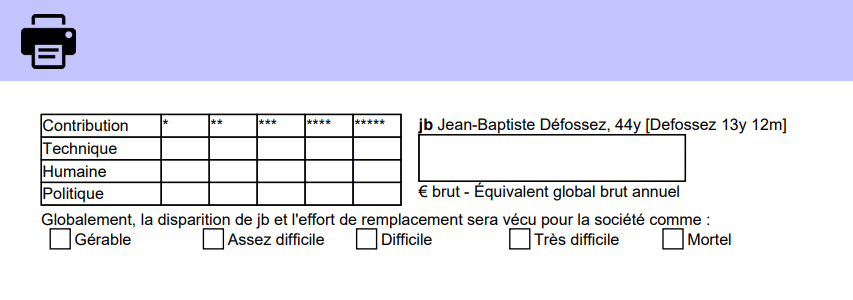Fair… or not?
It’s an employee’s right to a yearly performance review.
If, though, your face-to-face interviews with your manager are limited to once a year, unfortunately for you, the quality of your assessment by your manager may be nothing less than risky!
A review is a ritual of seduction in which the employee’s recent performance, be it positive or negative, determines the outcome. What I’ve noticed is that the outcome doesn’t necessarily have anything to do with performance, rather certain employees are, simply put, better at performance reviews.
It's more a question of presentation, I’d even say a sales negotiation. Think on it, you know if you are a good negotiator: take a look at your real estate investments, car purchases, or even if you’ve ever negotiated in a souk! If you’ve never really been any good at negotiations, the performance payoff may be farther out of reach for you.
Next, let's talk a bit about your relationship with your manager: does he appreciate your work? Does he value your investment in the company?...
Let's also talk about your manager himself, is he stingy? generous? His state of mind will influence your raise dramatically. Additionally, are you aware of the allotted budget given for team raises?
Personally, I felt the unfairness of these parameters and it pushed me to try something different, a system that, for example, would penalize introverts less. No need to sound the epic music and imagine a management world undergoing a revolution, the goal was simply to do better than just divide the cake in equal parts. Because, unless you are endearingly naive, you recognize that contributions to work are different from one collaborator to another.
Increase all salaries twice a year? And without a manager?
Almost two years ago, we defined a biannual process, with the following two objectives:
- Do more than just split the budget for salary increases equally by the number of people. In other words, better reward the most successful people.
- Distribute salary increases more fairly, based on annual appraisal interviews, than had been done in any previous processes.
Enacting this process twice a year is courageous because, in my opinion, compensation is often a source of demotivation. Nevertheless, by establishing a six-month period, this improves the statistics, plays down the unease that comes with raises and, above all, makes it possible to see one’s salary increase more often.
Anonymous?!?
Yes, you read right, it's an anonymous process, a bit like a democratic vote. All employees, including myself, must evaluate between 3 and 5 people, depending on the degree of interaction with other employees (calculated by our backoffice).
Each collaborator is evaluated by 4 people.
The "jury" selection is a mixture of proximity and luck: it’s likely that a close colleague is your assessor, but this is never guaranteed.
For every participant, certain criteria must be evaluated. How it works is described in detail at the bottom of this article.

The Big Bad Wolf
And so? Well, concretely it worked pretty well the first two times. Of course, I don’t agree with all of the evaluations, I find that some people are overvalued and others are undervalued. But, in my opinion, it’s logical and even healthy that I don’t completely agree with the outcomes. But overall, the process is still impressive qualitatively speaking. In light of the stated objectives, I think we can say that the process was not bad at all.
The third attempt, on the other hand, showed some qualitative flaws #letdown #sad #outofsync #karafungroupisnotperfect
I'm not naive, I figured it could happen. But when it does, it makes you think.
It’s my humble opinion that mistake must be made in order to progress. The third time, I made some communication errors and the system was not yet perfected. In other words, I crashed.
What kind of flaws are we talking about here?
I will take two concrete examples.
The first is from one of my personal evaluations, that of my salary as CEO of KaraFun Group. The assessment by my peer noted a recommended that my gross annual salary be 38,000€, including benefits. It may be presumptuous of me, but the amount is really far from what I would ask if I were to work as a group director in a different company. In any case, it’s very far from my value on the market.
The second example concerns the evaluation of the “replaceability rating” (see the bottom of the article to understand this criterion). One of our developers received a one out of five star rating. Mind you, this is a developer who knows his domain perfectly and who is amazingly efficient at his job and who is, in fact, literally irreplaceable (I’m sure that many of you know the difficulty of recruiting good tech profiles).
In both cases, it is either a matter of stupidity or a voluntary act of sabotage. And, more than likely, you like I, don’t like working with stupid people and even less so with the dishonest!
Challenge and improve
It has been almost two years since we started this process. It's not perfect, but that's not the goal. And besides, it never will be.
Why all these flaws?
My first hypothesis explains the bugs in this system by those not respecting the need for anonymity and informal discussions that happened around the evaluations. At one point, in a monthly meeting, I had pushed people to communicate between each other and share to the maximum, and in a way to break the anonymity. In hindsight, I don’t think it's positive overall. By overvaluing one peer over another, we’re not doing anybody a service and it’s ultimately detrimental to the other members of the team. But by undervaluing, one commits an act of malevolence. This may be misunderstood by certain team members, and they may be doing it involuntarily.
The second hypothesis is that there are some less benevolent people, or possibly that this particular system is a disappointment or a source of unhappiness. Thankfully these are a minority, otherwise the system would be totally out of order and should be abandoned.
But, we still needed to look for a way to qualify the results of the process and make it a performance indicator. After the third experience, alongside my brother (main shareholder and co-founder) and two other collaborators, we tried to breakdown the quality of the results. By sifting through all of the identifiable issues together, we have released an overall quality of 78.5% for the process. Instinctively, the third time was much worse than the first two tests, though we cannot be completely sure of this because the raw results of the previous evaluations were not kept.
The tool does not replace a raise in an exceptional case such as a change in responsibility for example. Moreover, one of the HR functions is to identify salary inconsistencies in the team, and therefore to re-evaluate when necessary. It is important to note that thanks to the peer review process, managers don’t have the possibility of blocking a pay raise.

Hesitations, doubts and certainties
Anonymity
From the get go, the process needs to be completely anonymous. We opted for an old-fashioned paper-based system, so, exit the digital vote. It’s important to guarantee anonymity. I also would also advise, based on our experience and albeit with some initial hesitation, to encourage employees not to reveal those that they are evaluating. Ideally, an employee should fill out the assessment at home, or in a quiet space, focused and in the morning or in the evening.
Responsibility
Naturally, all employees are not HR specialists. And moreover, lots of employees have never dreamed of becoming a manager.
KaraFun Group is not a company like any other. This specific responsibility for evaluation is delegated to all employees. I do recognize that the period of evaluations is not the most fun time for employees, but it does allow us to mechanically distribute power, while empowering each team member.
Thank you to each person on the team for taking this great responsibility seriously, with honesty, with diligence and with sincerity.
Trust
Because it is anonymous, this process is based on trust. It’s a process that can be broken quite easily. If even a quarter of participants choose "to be in the calculation" just because, rather than to evaluate peers with sincerity, results will no longer be satisfactory, to the extreme that the evaluations will no longer hold value. If that happens, I'll have to stop the experiment and start over with something more classic.
For me, at the root of it, is that the majority of people are honest and that employees will appreciate a system, even one that is certainly imperfect, that values the merit of every over stupidly dividing salary increases.
Feedback
The tool on its own is not a feedback tool, it was never designed to be so. But I try not to leave my employees hanging and left wondering. While not in place yet, I think it would be beneficial to try to explain these evaluation results to each person. In a one-to-one interview (1to1), for example, or in a scheduled discussion to analyze the results.
Feedback attempts to decode the given grades, in a way that takes the emotions out of it, and whether these grades are in accordance or not with what the other collaborator thinks, is irrelevant.
Feedback attempts to incite change and self-discovery.
If the evaluations are positive and the grades satisfactory, we must encourage and try to reinforce certain behaviors or a way of doing things. 😊
If some evaluations are unjustified, reassure the person. It may just boil down to an unfortunate bug. 🙁
If the evaluation is negative, try to understand it together and contemplate corrective actions. The goal of doing this together is to push towards betterment, even change, a behaviour or a way of doing things. 🙂
Conclusion
It is still a little early to draw conclusions about the validity of KaraFun Group's salary increase process. I’ll need to take more time to explain what is expected, to better understand the rules and to do everything to help each employee to make the right assessments. We must continue to remain vigilant on the quality of results, the possible biases and then systematize feedback. I am fortunate to work with great talents and I take this opportunity to thank them for being part of this experience.

How our our peer review works (in detail)
Thanks for reading this article so far, I hope it will be an inspiration to you. As promised, here is a detailed description of what each employee needs to evaluate. It describes the evaluation grid in July 2019, but as we are used to regularly updating our processes, nothing is set in stone. I must warn you that I don’t think it is transferable, neither easily nor universally, since every company has its own values and culture.
Part 1: Review
Employees must evaluate three criteria with a note between 1 and 5, a little like on TripAdvisor.
Technical (Skills)
Is this person doing the job properly?
Is this person a "master" of the trade, has he developed an area of excellence?
Does this person bring high added value?
Human (Team spirit)
What is this person’s contribution to the collective life of the company?
Is this person supportive and caring towards others?
Does this person have the ability to consider others and their opinions?
Does this person have the ability to replace someone if needed?
What is this person’s contribution to the team spirit?
Does this person communicate correctly?
Policy (Project of society)
What is this person’s contribution to the company vision: "To give joy through music," to the values: common sense / pragmatism (priority to action), joy / enthusiasm, music, long-term vision, humanism (to believe in one’s fellow human being, trust), respect for the land and its inhabitants, resistance to cynicism and to predetermined societal norms ( ideas, prejudices ...).
Does this person accept change and is he a facilitator of change?
Second part: test of disappearance
This next criterion must be evaluated between 1 and 5.
1) Manageable 2) Fairly difficult 3) Difficult 4) Very difficult 5) Impossible
Imagine that your colleague takes off for three years around the world, or that he leaves the company to go to IBM or a startup. It may be necessary to organize his replacement and participate in the training of the new recruit. Imagine the effort, and maybe the luck, needed to replace him...
Think of his different abilities, his qualities in the position he occupies and the benefits that our group derives from it.
Third part: Remuneration
It is necessary to indicate the remuneration which one thinks is appropriate for the colleague. Compared to my own compensation, the market and my colleague's contributions, I try to give an estimate of his remuneration (gross annual including benefits).
Do your best, keeping in mind that we can be off of course...
... But the job market is often pretty clear about the pay of a particular job. What I often say is that it's not me who sets your base salary, but the market. Depending on the job, it may be difficult to accept, but that’s how it works.

